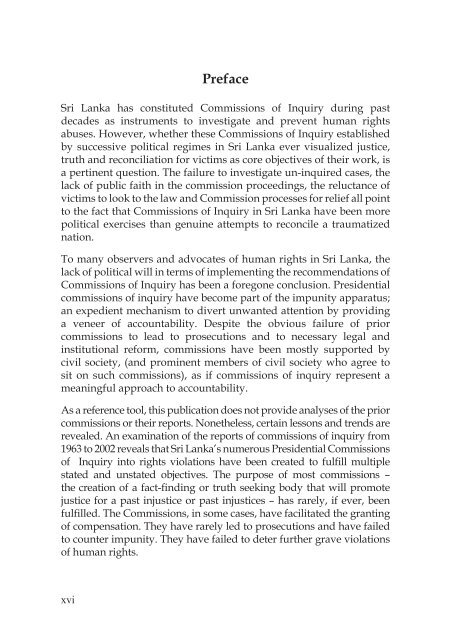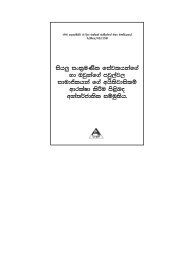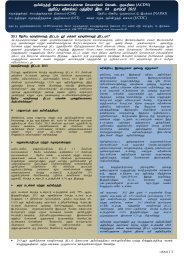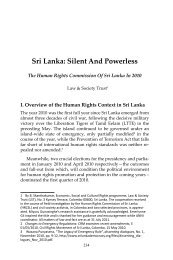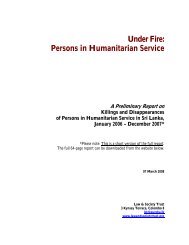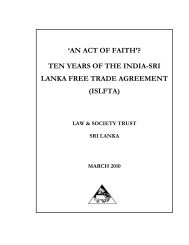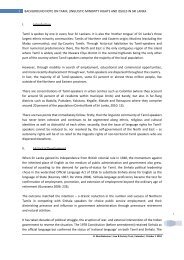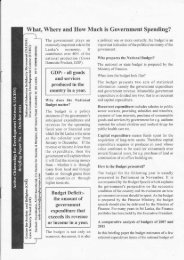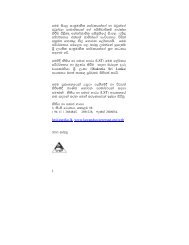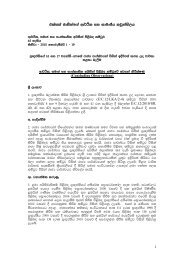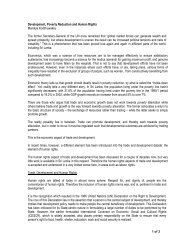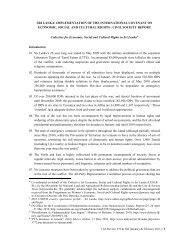sri lanka's commissions of inquiry - Law & Society Trust
sri lanka's commissions of inquiry - Law & Society Trust
sri lanka's commissions of inquiry - Law & Society Trust
You also want an ePaper? Increase the reach of your titles
YUMPU automatically turns print PDFs into web optimized ePapers that Google loves.
Preface<br />
Sri Lanka has constituted Commissions <strong>of</strong> Inquiry during past<br />
decades as instruments to investigate and prevent human rights<br />
abuses. However, whether these Commissions <strong>of</strong> Inquiry established<br />
by successive political regimes in Sri Lanka ever visualized justice,<br />
truth and reconciliation for victims as core objectives <strong>of</strong> their work, is<br />
a pertinent question. The failure to investigate un-inquired cases, the<br />
lack <strong>of</strong> public faith in the commission proceedings, the reluctance <strong>of</strong><br />
victims to look to the law and Commission processes for relief all point<br />
to the fact that Commissions <strong>of</strong> Inquiry in Sri Lanka have been more<br />
political exercises than genuine attempts to reconcile a traumatized<br />
nation.<br />
To many observers and advocates <strong>of</strong> human rights in Sri Lanka, the<br />
lack <strong>of</strong> political will in terms <strong>of</strong> implementing the recommendations <strong>of</strong><br />
Commissions <strong>of</strong> Inquiry has been a foregone conclusion. Presidential<br />
<strong>commissions</strong> <strong>of</strong> <strong>inquiry</strong> have become part <strong>of</strong> the impunity apparatus;<br />
an expedient mechanism to divert unwanted attention by providing<br />
a veneer <strong>of</strong> accountability. Despite the obvious failure <strong>of</strong> prior<br />
<strong>commissions</strong> to lead to prosecutions and to necessary legal and<br />
institutional reform, <strong>commissions</strong> have been mostly supported by<br />
civil society, (and prominent members <strong>of</strong> civil society who agree to<br />
sit on such <strong>commissions</strong>), as if <strong>commissions</strong> <strong>of</strong> <strong>inquiry</strong> represent a<br />
meaningful approach to accountability.<br />
As a reference tool, this publication does not provide analyses <strong>of</strong> the prior<br />
<strong>commissions</strong> or their reports. Nonetheless, certain lessons and trends are<br />
revealed. An examination <strong>of</strong> the reports <strong>of</strong> <strong>commissions</strong> <strong>of</strong> <strong>inquiry</strong> from<br />
1963 to 2002 reveals that Sri Lanka’s numerous Presidential Commissions<br />
<strong>of</strong> Inquiry into rights violations have been created to fulfill multiple<br />
stated and unstated objectives. The purpose <strong>of</strong> most <strong>commissions</strong> –<br />
the creation <strong>of</strong> a fact-finding or truth seeking body that will promote<br />
justice for a past injustice or past injustices – has rarely, if ever, been<br />
fulfilled. The Commissions, in some cases, have facilitated the granting<br />
<strong>of</strong> compensation. They have rarely led to prosecutions and have failed<br />
to counter impunity. They have failed to deter further grave violations<br />
<strong>of</strong> human rights.<br />
xvi


